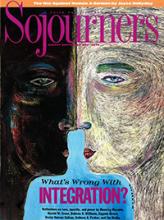See to it that no one falls away from God; that no bitter root springs up through which many may become defiled; that there be among you no fornicator or godless person like Esau, who sold his birthright for a meal. You know that afterward he wanted to inherit his father's blessings, but was rejected because he had no opportunity to alter his choice, even though he sought the blessing with tears. —Hebrews 12:15-17
TODAY'S YOUNG GENERATION OF African Americans is inthe midst of a spiritual crisis. I am referring specifically to those black women and men who, like me, were born in the mid-to-late 1960s and came of age during the '80s under the Reagan administration. The promise of integration, the freedom for blacks to assimilate into white society, was gained at the expense of our cultural birthright; that sense of community and morality that sustained our elders through thick and thin. Consequently, black America, at one time the moral conscience of the nation, now finds itself to be a reflection of this society's most base values.
The concept of integration is, ultimately, a spiritual issue for black America. Not a political issue. Not a social issue. Not an economic issue. This is not to say that there aren't political, social, and economic ramifications for blacks in our daily existence in white America. But blacks' involvement in these three areas can only be edifying to ourselves, and to this nation, when our spiritual and moral vision is clear.
And it used to be. Unlike the generation of blacks who reached maturity before, and during, the early '70s, my generation has no memory of credible black leaders, such as Malcolm X or Martin Luther King Jr. Nor do we have a relationship with those indigenous institutions, such as the black church, that developed as a consequence of racism and segregation. The debilitating effects of racism and segregation notwithstanding, blacks had been able to instill a sense of self and community. But the practice of integration created the illusion of equality with the wider culture, effectively wresting control of the black freedom movement by holding it hostage to federal good will and weakening or destroying those institutions that influenced blacks' worldview.
Read the Full Article
